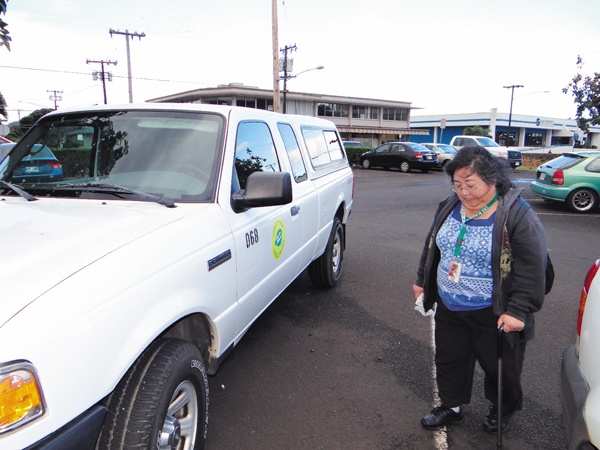LIHUE — A County Vehicles Audit Report says the county needs to improve how it monitors, reports and authorizes employee vehicle use. The County of Kauai, the report says, may be liable for back taxes for not enforcing its own
LIHUE — A County Vehicles Audit Report says the county needs to improve how it monitors, reports and authorizes employee vehicle use.
The County of Kauai, the report says, may be liable for back taxes for not enforcing its own policy. As a result of the audit, the county is updating employee vehicle use enforcement policies to improve monitoring and is preparing for possible state and federal tax issues.
“We are reviewing the auditor’s final report, but are already in the process of addressing a number of issues raised in the audit,” said County Finance Director Steve Hunt.
The audit released Tuesday took nine months to complete. It was conducted by PKF Pacific Hawaii LLP, an accounting firm on behalf of the Kauai County Auditor’s Office.
“At least now the Kauai County Government will be in compliance,” said County Auditor Ernesto Pasion. “As a governing and taxing authority, the county is also required to comply with the law, and the use of government vehicles is also subject to compliance with state and federal laws.”
The county vehicle policy was adopted in 1999, and has not been implemented properly since, Pasion said. The monitoring and enforcement has been left up to the individual departments.
“It was probably just an oversight and it was overlooked,” he said.
The PKF Pacific Hawaii auditor found that, in one instance, a county employee was allowed to take a county vehicle home when they should not have been approved to do so. The audit process revealed the error and it was stopped, Pasion said.
The first finding of the audit was that the county vehicle policy did not comply with state law and is inadequate with “possible noncompliance, abuse, waste, inefficiency.” A 2002 revised policy lacked guidance on appropriate use or restriction of non-take-home vehicles, and difficulty in determining where abuse was taking place, the report stated.
The county response to the audit’s recommendations was to revise its comprehensive vehicle policy with improved uniformed monitoring and standards of acceptable vehicle use, as directed by the Department of Finance.
The audit suggested more revisions to the county Comprehensive Motor Vehicle Policy that was approved in August 2013.
The second finding was that the county is vulnerable to state and federal tax implications related to the use of approved take-home vehicles. Prior to July 2013, the county did not account for the value of employee take-home vehicles and the county could be liable for additional federal payroll withholding taxes and state retirement contributions, the report stated.
There isn’t an estimate on that possible amount yet because the county is planning to work with the Internal Revenue Service on the matter.
Qualifying for a take-home vehicle depends on the nature of job, Pasion added. The requests were being approved by department heads when they needed to go through the finance director and then get the mayor’s approval.
“They weren’t doing that,” Pasion said.
The report also found the county needed to comply with tax rules and regulations on reporting fringe benefit values of county vehicles used by employees.
The IRS considers the use a county vehicle for commuting purposes as an employment fringe benefit. Individuals who were assigned take-home vehicles, as well as the county, may be liable for additional payroll related withholding taxes with standard daily payments or per mile reimbursements for privately-owned vehicles.
This is a retroactive benefit back to 2002 that needs to be reported and adjusted, Pasion said. Rather than hire a tax expert, the Department of Finance plans to work directly with the IRS on the issue.
“We looked at other jurisdictions and they also have compliance problems, too,” Pasion said.
This audit is the third to examine county fuel use and the only one not conducted by Pasion’s office.
They were told not to perform the audit for potential bias based on familiarity with employees that use county vehicles, he said.
“We were initially going to do it in-house and then we had this question about knowing some of these people who are driving county vehicles,” Pasion said.
Earlier audits resulted in a new Fuel Master Pro system, improved accounting of fuel dispensed at county base yards, and use of the Kauai Automated Fuels Network credit cards at private pumps.
• Tom LaVenture, staff writer, can be reached at 245-0424 or by emailing tlaventure@thegardenisland.com.


